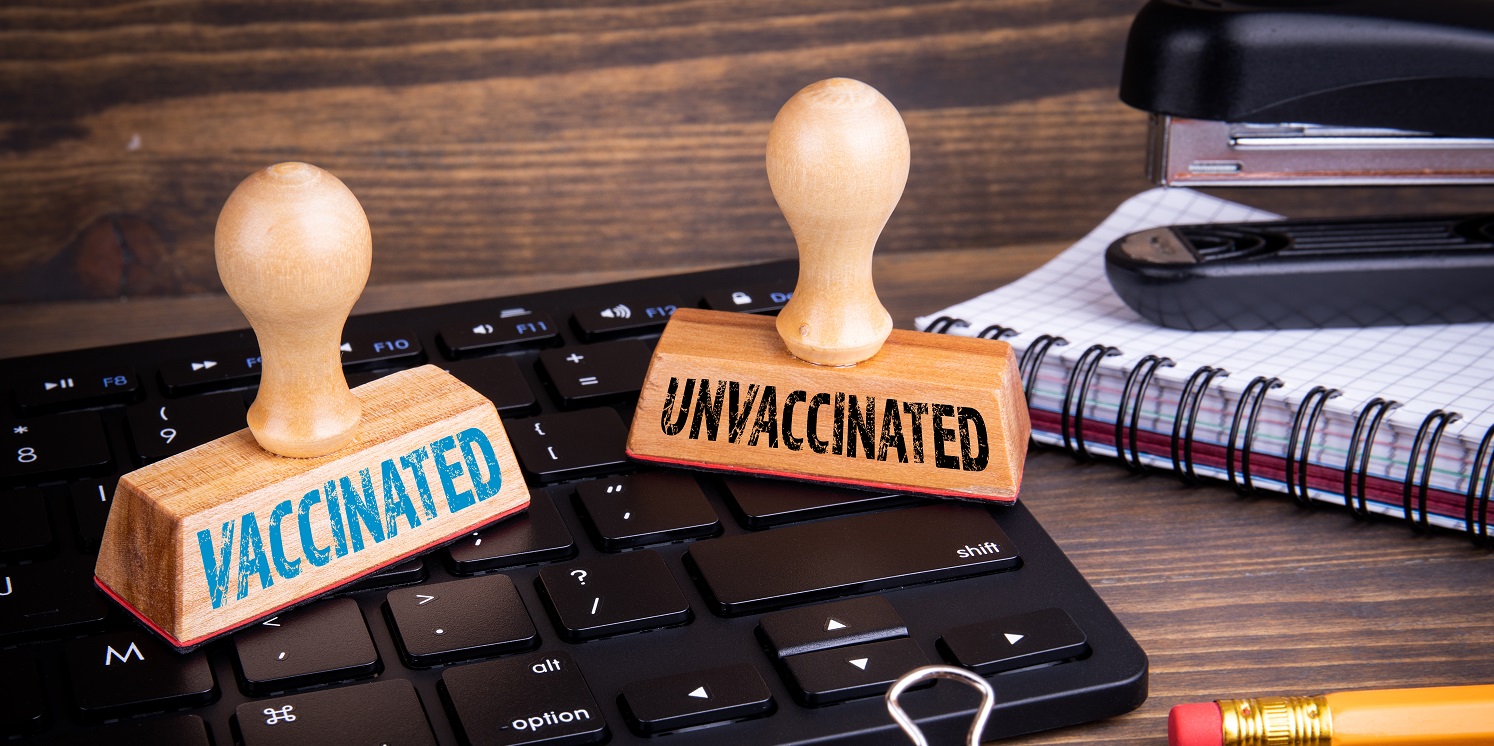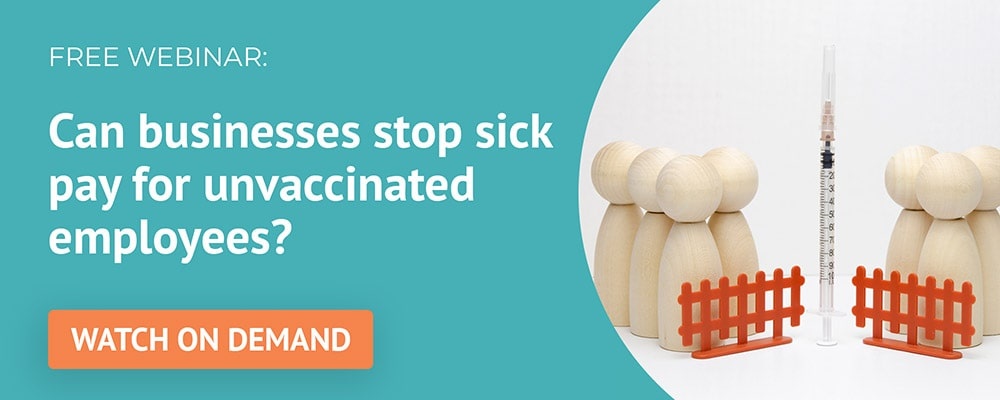Ikea recently announced that they have decided not to give company sick pay to unvaccinated employees who must isolate because they have been in close contact with a positive COVID-19 case. The company is certainly not the first to do so, as other firms have been cutting sick pay for unvaccinated workers in this situation too, including Morrisons and Wessex Water.
The announcement has caused a bit of a stir in the HR and employment law spheres, in terms of the more direct implications of stopping company sick pay for unvaccinated staff who need to isolate, and also what further company rules may be brought in that treat vaccinated and unvaccinated workers differently.
What do the experts think?
Below, a number of HR and employment law experts explore the legal and employee relations issues around stopping company sick pay for isolating unvaccinated employees (please note that any organisation looking to change their sick pay policy in relation to the COVID-19 vaccination status of their employees should first seek specific legal advice).
“Employers will not be able to implement a blanket ‘No Jab, No Company Sick Pay’ policy”
Charlotte Geesin, Legal Director at Howarths
 Charlotte recently wrote on the Howarths blog: “Employers who want to consider adjusting their company sick pay policies in a way reflective of Ikea and others will need to be able to objectively justify the proposed change and, when the company sick pay entitlement is contractual, embark upon a process of consultation with staff in an attempt to obtain their consent.
Charlotte recently wrote on the Howarths blog: “Employers who want to consider adjusting their company sick pay policies in a way reflective of Ikea and others will need to be able to objectively justify the proposed change and, when the company sick pay entitlement is contractual, embark upon a process of consultation with staff in an attempt to obtain their consent.
"Employers will not be able to implement a blanket ‘No Jab, No Company Sick Pay’ policy and they will have to include caveats for considerations including: medical conditions; religious belief; age; and pregnancy, as well as considering each case on its own merits to look at the overall reasonableness and lawfulness of a decision to withhold any company sick pay.”
"Are they even entitled to sick pay?"
Jacqui Mann, Director at J Mann Associates

"Another consideration is whether or not the sick pay is contractual. Removing sick pay without consultation is risky. On the other hand, if the employee is unvaccinated and is isolating but does not have COVID, then are they even entitled to sick pay as they are not ill? Lots of questions."
“It’s time companies look at their policies in a different way”
Archita Misra (MCIPD), HR Generalist
 “Taking or not taking vaccines is an individual’s personal choice. We are currently living in a society where freedom of choice is of paramount importance. Having said that, people also need to be objective in the way they make choices, particularly if their actions have wider consequences for society. With no foresight of a complete end to this situation, panic seems to be natural for everyone.
“Taking or not taking vaccines is an individual’s personal choice. We are currently living in a society where freedom of choice is of paramount importance. Having said that, people also need to be objective in the way they make choices, particularly if their actions have wider consequences for society. With no foresight of a complete end to this situation, panic seems to be natural for everyone.
“I believe it’s time companies look at their policies in a different way. The pandemic has paved the way for a more flexible and individualistic approach to situations. Reducing sick pay as a blanket policy for all unvaccinated staff might not seem to be a logical or legal solution in the current scenarios. This might lead to legal hassles in the case of employees who might have genuine reasons for not getting vaccinated.”
"A myriad of complex legal issues will flow from this decision"
Jennifer Smith, Partner at Forbes Solicitors
 "IKEA’s decision highlights a shift in the way in which businesses are now approaching the pandemic, particularly those which are service-led and reliant on staff being in stores and warehouses. We have received a few enquiries from companies keen to follow suit, since the retail giant’s announcement.
"IKEA’s decision highlights a shift in the way in which businesses are now approaching the pandemic, particularly those which are service-led and reliant on staff being in stores and warehouses. We have received a few enquiries from companies keen to follow suit, since the retail giant’s announcement.
"A myriad of complex legal issues will flow from this decision and companies need to be very careful not to indirectly discriminate against people. I suspect that this is why IKEA has confirmed that matters will be assessed on a case by case basis, so as to avoid a blanket policy."
“There could be a discrimination issue”
Matthew Ainscough, Senior Employment Lawyer at Bell & Buxton incorporating Ironmonger Curtis
 “I think that they probably can do this, on the basis that an unvaccinated worker who has been in close contact with someone testing positive (rather than testing positive themselves) will not be classed as being 'sick', which is likely to be the criteria required in order to be entitled to the company's contractual sick pay scheme (though this could also be the legal position for vaccinated workers who are self-isolating due to a close contact testing positive too).”
“I think that they probably can do this, on the basis that an unvaccinated worker who has been in close contact with someone testing positive (rather than testing positive themselves) will not be classed as being 'sick', which is likely to be the criteria required in order to be entitled to the company's contractual sick pay scheme (though this could also be the legal position for vaccinated workers who are self-isolating due to a close contact testing positive too).”
“However, if a worker is unvaccinated due to a medical condition that amounts to a disability, there could be a discrimination issue potentially.”
“Proceed with extreme caution”
Kate Marchant (ACIPD), HR Consultant at Running HR Ltd
 “My advice for any employers considering this approach is to proceed with extreme caution. Taking such an approach will be very risky before we even debate whether it’s ethical or not.
“My advice for any employers considering this approach is to proceed with extreme caution. Taking such an approach will be very risky before we even debate whether it’s ethical or not.
“Ikea are addressing it on a case by case basis, and this is key, rather than applying a blanket one size fits all approach. It’s fairer and takes individual circumstances into account, not to mention helping to avoid costly discrimination claims.”
“Vaccinated colleagues are left to work and pick up the slack”
Rachel Saunders, HR Consultant at SunStone HR
 “It’s not sick pay per se; if they are sick with COVID-19 because they are unvaccinated, then they will still get paid as far as I can see. It’s the fact that they have to self-isolate if they are a close contact, whereas the vaccinated can continue working. Therefore the unvaccinated, with the current rate of infection, could continuously be forced to self-isolate when they aren’t sick and, without the policy change, be paid at full pay - whilst their vaccinated colleagues are left to work and pick up the slack.
“It’s not sick pay per se; if they are sick with COVID-19 because they are unvaccinated, then they will still get paid as far as I can see. It’s the fact that they have to self-isolate if they are a close contact, whereas the vaccinated can continue working. Therefore the unvaccinated, with the current rate of infection, could continuously be forced to self-isolate when they aren’t sick and, without the policy change, be paid at full pay - whilst their vaccinated colleagues are left to work and pick up the slack.
“They have caveated it with “individual circumstances” so they are unlikely to fall down on discrimination as they will pay those who are unable to have the jab due to a protected characteristic.
“It does make you wonder whether they will push this out further though, and reduce sick pay if they are physically sick with COVID-19 but unvaccinated – but that is an entirely different debate in my opinion.”
“It is problematic from an employee relations perspective”
Gemma Dale, HR Consultant at The Work Consultancy
 “I think whilst potentially lawful, it is problematic from an employee relations perspective and may well have damaging unintended consequences, including the potential for employees to come to work whilst unwell to avoid a reduction in pay.
“I think whilst potentially lawful, it is problematic from an employee relations perspective and may well have damaging unintended consequences, including the potential for employees to come to work whilst unwell to avoid a reduction in pay.
"I think at some point someone will run the argument in an Employment Tribunal that anti-vaccination views are a protected belief; however, based on the current test set out in case law, I would be surprised to see a successful outcome.”
Read more from the myhrtoolkit blog
Sick leave self-certification extended and SSP rebate scheme reintroduced
COVID-19 vaccines and the workplace: what are the legal issues?

Written by Camille Brouard
Camille is a Senior Marketing Executive for myhrtoolkit who writes on topics including HR technology, workplace culture, leave management, diversity, and mental health at work.


 Holiday Planner
Holiday Planner Absence Management
Absence Management Performance Management
Performance Management Staff Management
Staff Management Document Management
Document Management Reporting
Reporting Health and Safety Management
Health and Safety Management Task Management
Task Management Security Centre
Security Centre Self Service
Self Service Mobile
Mobile




